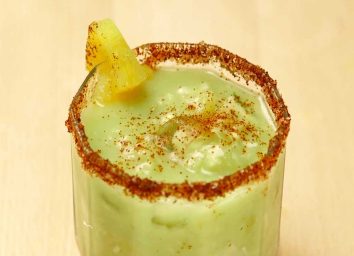It used to be that "good fat" was the biggest food oxymoron since jumbo shrimp. Things are much different now than when grandpa used to walk six miles to school in the rain and children were born without iPhones. Science has proven that certain fats can actually help you slim down, and coconut oil is one of the best.
A study of 30 men published in the journal Pharmacology found that those who ate 2 tablespoons of coconut oil a day shrank their waists by an average of 1.1 inches in one month. What's behind this wizardry?
Coconut Oil's Unique MCTs Increase Calorie Burn
Studies have shown that the capric acid and other medium-chain triglycerides (MCT) in coconut oil can increase energy expenditure in humans by as much as 5 percent. Burning an extra 100 to 120 calories per day might not sound like much, but over a year, it amounts to at least 36,000 calories. That's more than you'd find in over 10 pounds of belly fat!
MCTs are actually great for building muscle. In fact, the kind found in coconut are also used in popular muscle-boosting products. One downside to those supplements: Many use processed MCTs. By eating actual coconut oil, you'll get those fat-burning triglycerides in their most natural and effective form.
Coconut Oil Fats Reduce Appetite
Researchers have also found that coconut oil helps reduce appetite. They believe that's due to how the fatty acids in coconut are metabolized. In one study, varying amounts of medium- and long-chain triglycerides were fed to six healthy men. The men who consumed the most MCTs ate 256 fewer calories per day on average!
In a second short study of 14 men, scientists discovered that those who ate the most MCTs at breakfast ate significantly fewer calories at lunch. So start your day with two tablespoons of coconut oil to your favorite smoothie, or stir a spoonful into coffee.
Buy This! Nutiva Organic MCT Oil, $23.40, Amazon.com
Coconut Oil Fats Balance Insulin
All powerful results—and yet there's more. The lauric acid in coconut oil may help guard against insulin resistance, one of the major risk factors for Type 2 diabetes. The body releases insulin to process sugar in the bloodstream; insulin resistance happens when the body's cells refuse to respond to insulin—say, when a person consumes too much sugary junk—and therefore can no longer use glucose for energy.
The pancreas pumps out more insulin, creating a cycle of overproduction and leading to diabetes. But the MCT's in coconut oil can help balance insulin, because our bodies produce ketones when we consume it. Ketones relieve the strain on the pancreas by giving the body a consistent energy source that isn't dependent on glucose reactions.
Eat This! Tip
Now don't go overboard—in the case of coconut oil, it is possible to get too much of a good thing. Although it's considered a "healthy" saturated fat, you can still overeat coconut oil. So enjoy it in moderation, and rotate your consumption of the oil with other healthy oils such as extra virgin olive oil, avocado oil, grapeseed oil, grass-fed butter, and ghee. And read up on more of these healthy fats in our article 20 Healthy Fats to Make You Thin.








